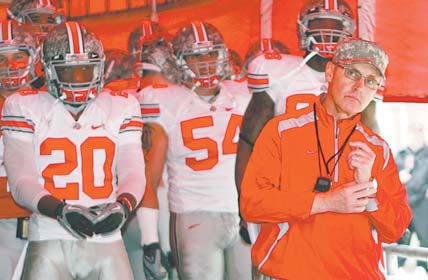OSU gets bowl ban, other penalties


Ohio State players broke the rules and got to play in the Sugar Bowl anyway. Jim Tressel knew about infractions and let it all happen.
Associated Press
COLUMBUS
Ohio State players broke the rules and got to play in the Sugar Bowl anyway. Jim Tressel knew about infractions and let it all happen.
Now the Buckeyes and new coach Urban Meyer will pay for it next season.
The NCAA hit Ohio State with a one-year bowl ban and additional penalties Tuesday for violations that started with eight players taking a total of $14,000 in cash and tattoos in exchange for jerseys, rings and other Buckeyes memorabilia.
Tressel was tipped to the violations in April 2010 but didn’t tell anyone — even after the athletes got caught last December but were allowed to play in the Sugar Bowl against Arkansas if they served suspensions to start the 2011 season. Among those in the group: starting quarterback Terrelle Pryor and leading rusher Daniel “Boom” Herron (Warren Harding High).
Tressel’s silence damaged Ohio State in the eyes of the NCAA and the result is that the Buckeyes, with a plum 2012 schedule and perhaps college football’s best coach in Meyer, will watch next year’s bowl games on TV.
“Had we known what [Tressel] knew, we would not have played those young men in that bowl game,” said an emotional Gene Smith, Ohio State’s athletic director.
Forced out in May and now on the staff of the Indianapolis Colts, Tressel was called out by the NCAA for unethical conduct and will have a hard time coaching at the college level again.
“He’s not going to appeal. He accepts the committee’s decision. That’s all there is to say,” said Gene March, an attorney for Tressel.
The university had previously offered to vacate the 2010 season, return bowl money, go on two years of NCAA probation and use five fewer football scholarships over the next three years.
But the NCAA countered with the postseason ban, more limitations on scholarships and tacked on a year of probation.
“It is still my goal to hire excellent coaches, recruit great student-athletes who want to be a part of this program and to win on and off the field,” Meyer said in a statement. “The NCAA penalties will serve as a reminder that the college experience does not include the behavior that led to these penalties.”
Ohio State might still have escaped more severe penalties had its problems stopped with the original scandal, which grew out of players’ relationship with a Columbus tattoo parlor owner named Eddie Rife who was under federal investigation in a drug-trafficking case.
But the school and the NCAA discovered two additional problems — after Ohio State went before the committee on infractions in August.
Three players were suspended just before the start of the season for accepting $200 from booster Bobby DiGeronimo. Then midway through the Buckeyes’ 6-6 season it was revealed that several players had been paid too much for too little work on summer jobs — supplied by the same booster. He has been disassociated from the program.
 43
43
